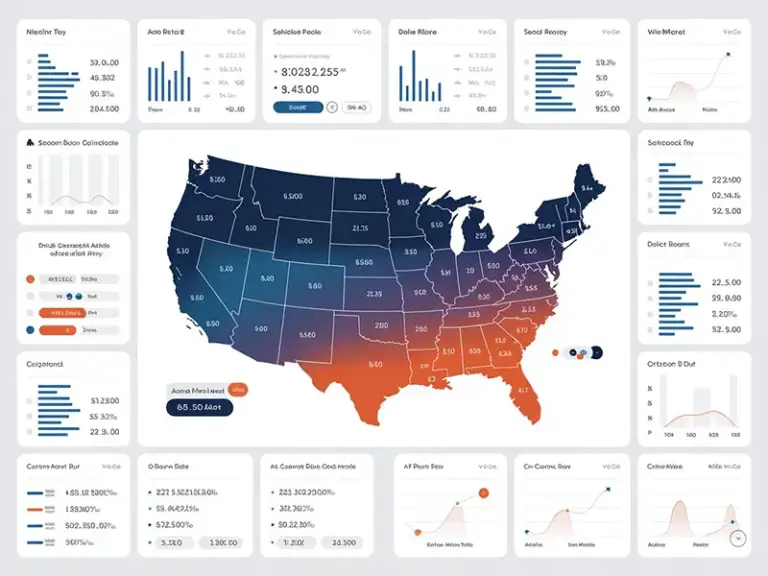In today’s increasingly competitive global e-commerce landscape, many sellers discover that the same product exhibits significant differences in search results, rankings, and even pricing across different regions. These geographic data variations harbor tremendous commercial value, yet precisely capturing this ZIP code-distributed data has become a technical challenge. Traditional data collection methods often overlook geographic factors, resulting in analysis lacking regional specificity and missing golden opportunities for localized operations.
Amazon, as the world’s largest e-commerce platform, adjusts search results based on users’ geographic locations through its search algorithm. Different ZIP code regions may display completely different product rankings, pricing strategies, and recommended items. These geographic differences not only influence consumer purchasing decisions but directly impact sellers’ traffic allocation and sales conversion. However, most data collection tools cannot effectively simulate user behavior across different regions, resulting in data lacking geographic representativeness.
Facing this challenge, various solutions have emerged in the market. From simple IP proxy switching to complex geographic location simulation, from traditional crawlers to professional API services, each method has its applicable scenarios and limitations. Choosing the appropriate technical solution not only affects data collection accuracy but also impacts subsequent business decision effectiveness. Wrong technical choices may lead to data bias, thereby affecting entire operational strategy formulation.
Core Challenges in Geographic Data Collection
Amazon’s geographic algorithm is more complex than imagined. The platform not only determines geographic location based on users’ IP addresses but also combines historical purchase records, shipping addresses, payment methods, and other multi-dimensional information to adjust search results. This means simple IP proxy switching often cannot obtain authentic regional data, requiring more sophisticated technical means to simulate real users’ geographic environments.
Data consistency presents another key challenge. Regional data obtained at different time periods and network environments may vary, making ensuring data timeliness and accuracy a technical difficulty. Meanwhile, large-scale regional data collection faces multiple technical barriers including anti-scraping detection, request frequency limitations, and account security, requiring comprehensive consideration of efficiency and security balance.
Technical Implementation Solution Comparison
Traditional proxy IP solutions, while cost-effective, have obvious limitations. Most proxy services provide IP addresses lacking precise geographic positioning information, unable to meet ZIP code-level precision collection requirements. More importantly, Amazon’s anti-scraping system can already identify most proxy IPs, leading to continuously declining collection success rates.
Browser automation-based solutions can better simulate real user behavior, achieving certain regional simulation through geographic location API settings. However, these solutions have low execution efficiency, difficulty supporting large-scale data collection demands, and relatively high maintenance costs.
Professional API services provide more reliable solutions. Taking Pangolin Scrape API as an example, its regional collection functionality can precisely simulate user environments across different ZIP codes, obtaining authentic regional search results. This solution not only has lower technical barriers but also ensures data accuracy and stability, particularly suitable for enterprise users requiring large-scale regional data analysis.
Pangolin ZIP Code Collection Technical Advantages
Pangolin Scrape API demonstrates significant technical advantages in regional data collection. Its core technology can precisely simulate user environments across various US ZIP code regions, including geographic location, network characteristics, device fingerprints, and other dimensions, ensuring obtained search results have authentic regional representativeness.
Regarding data accuracy, Pangolin’s regional collection functionality has undergone extensive practical verification, accurately reflecting price differences, ranking changes, and product availability across different regions. This high-precision data collection capability provides reliable data support for cross-regional operational strategies, helping sellers discover geographic business opportunities.
In technical implementation, Pangolin provides concise API interfaces supporting batch ZIP code specification for data collection. Developers only need to add regional parameters in requests to obtain corresponding regional search results, significantly reducing technical implementation complexity.
Practical Application Code Example
Here’s a Python implementation example using Pangolin API for ZIP code collection:
import requests
import json
from concurrent.futures import ThreadPoolExecutor
import time
class AmazonZipCodeCollector:
def __init__(self, api_key):
self.api_key = api_key
self.base_url = "https://api.pangolinfo.com/scrape"
self.headers = {
'Authorization': f'Bearer {api_key}',
'Content-Type': 'application/json'
}
def collect_by_zipcode(self, keyword, zip_code, page=1):
"""Collect Amazon search results by ZIP code"""
payload = {
'url': f'https://www.amazon.com/s?k={keyword}&page={page}',
'zip_code': zip_code,
'parse': True,
'format': 'json'
}
try:
response = requests.post(
self.base_url,
headers=self.headers,
json=payload,
timeout=30
)
if response.status_code == 200:
data = response.json()
return self.parse_search_results(data, zip_code)
else:
print(f"Request failed: {response.status_code}")
return None
except Exception as e:
print(f"Collection error: {str(e)}")
return None
def parse_search_results(self, data, zip_code):
"""Parse search result data"""
products = []
if 'products' in data:
for product in data['products']:
product_info = {
'zip_code': zip_code,
'asin': product.get('asin'),
'title': product.get('title'),
'price': product.get('price'),
'rating': product.get('rating'),
'reviews_count': product.get('reviews_count'),
'rank': product.get('rank'),
'availability': product.get('availability'),
'prime_eligible': product.get('prime_eligible'),
'sponsored': product.get('sponsored', False)
}
products.append(product_info)
return products
def batch_collect_regions(self, keyword, zip_codes, max_workers=5):
"""Batch collect multi-regional data"""
all_results = []
with ThreadPoolExecutor(max_workers=max_workers) as executor:
futures = []
for zip_code in zip_codes:
future = executor.submit(
self.collect_by_zipcode,
keyword,
zip_code
)
futures.append(future)
time.sleep(0.5) # Control request frequency
for future in futures:
result = future.result()
if result:
all_results.extend(result)
return all_results
def analyze_regional_differences(self, results):
"""Analyze regional differences"""
regional_analysis = {}
for product in results:
zip_code = product['zip_code']
if zip_code not in regional_analysis:
regional_analysis[zip_code] = {
'product_count': 0,
'avg_price': 0,
'prime_rate': 0,
'sponsored_rate': 0,
'products': []
}
regional_analysis[zip_code]['products'].append(product)
regional_analysis[zip_code]['product_count'] += 1
# Calculate regional statistical indicators
for zip_code, data in regional_analysis.items():
products = data['products']
# Average price
prices = [float(p['price'].replace('$', '').replace(',', ''))
for p in products if p['price']]
data['avg_price'] = sum(prices) / len(prices) if prices else 0
# Prime ratio
prime_count = sum(1 for p in products if p['prime_eligible'])
data['prime_rate'] = prime_count / len(products) if products else 0
# Sponsored ratio
sponsored_count = sum(1 for p in products if p['sponsored'])
data['sponsored_rate'] = sponsored_count / len(products) if products else 0
return regional_analysis
# Usage example
if __name__ == "__main__":
# Initialize collector
collector = AmazonZipCodeCollector("your_pangolin_api_key")
# Define target keyword and regions
keyword = "wireless headphones"
target_zipcodes = [
"10001", # New York
"90210", # Los Angeles
"60601", # Chicago
"77001", # Houston
"33101" # Miami
]
# Batch collect regional data
print("Starting multi-regional data collection...")
results = collector.batch_collect_regions(keyword, target_zipcodes)
# Analyze regional differences
analysis = collector.analyze_regional_differences(results)
# Output analysis results
print(f"\n=== {keyword} Regional Difference Analysis ===")
for zip_code, data in analysis.items():
print(f"\nZIP Code: {zip_code}")
print(f"Product Count: {data['product_count']}")
print(f"Average Price: ${data['avg_price']:.2f}")
print(f"Prime Rate: {data['prime_rate']:.2%}")
print(f"Sponsored Rate: {data['sponsored_rate']:.2%}")
Data Applications and Business Value
Geographic data obtained through ZIP code collection has rich commercial application value. Sellers can formulate differentiated pricing strategies based on price differences across regions, appropriately increasing prices in high-value areas while adopting more competitive pricing in price-sensitive regions. This refined pricing strategy can significantly improve overall profit margins.
Geographic keyword optimization represents another important application direction. Consumers in different regions may use different search terms. By analyzing search result differences across regions, sellers can specifically optimize product titles and keywords, improving search rankings and exposure in specific areas.
Inventory management and logistics optimization can also benefit from regional data. By analyzing product demand intensity and competitive situations across different regions, sellers can more reasonably allocate inventory resources, optimize delivery strategies, reduce logistics costs while improving customer satisfaction.
Technical Implementation Considerations
When implementing ZIP code collection, data quality control is a key component. Establishing comprehensive data validation mechanisms through multi-dimensional data cross-validation ensures collection result accuracy. Meanwhile, attention to data timeliness is important, regularly updating collected data to reflect latest market changes.
Compliance considerations are equally important. When conducting large-scale data collection, strict adherence to relevant laws, regulations, and platform policies ensures data usage legality. Choosing professional API service providers like Pangolin not only ensures technical implementation reliability but also guarantees collection behavior compliance.
Cost-benefit analysis is also an important decision factor. While professional API services may have higher direct costs than self-built solutions, considering development time, maintenance costs, data accuracy, and business risks comprehensively, professional services often provide better return on investment.
Future Development Trends
As e-commerce platform algorithms continuously upgrade, geographic data collection technology continues evolving. Artificial intelligence and machine learning technology applications will make regional data analysis more intelligent, automatically identifying geographic business opportunities and risk points.
Real-time data collection and analysis will become important sources of competitive advantage. Future regional data collection systems will provide near real-time data updates, helping sellers quickly respond to market changes and seize business opportunities.
Cross-platform geographic data integration is also a development direction. By integrating regional data from Amazon, eBay, Walmart, and other platforms, sellers will obtain more comprehensive market insights, formulating more precise omnichannel operational strategies.
Overall, Amazon ZIP code collection technology provides e-commerce sellers with powerful geographic analysis capabilities. By choosing appropriate technical solutions, particularly professional services like Pangolin Scrape API, sellers can obtain high-quality regional data, providing strong support for refined operations and differentiated competition. In the data-driven e-commerce era, mastering geographic data collection technology will become one of the key success factors.



